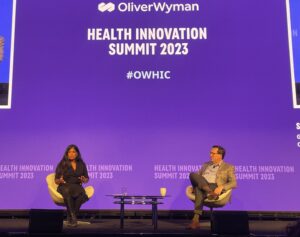
-
Cartwheel Snags $20M For School-based Mental Health Services
Cartwheel, a startup that partners with school districts to provide virtual mental health services, raised $20 million in Series A funds. The company is working with about 50 school districts and charter school networks across Massachusetts, Illinois, New York, Rhode Island and Connecticut.
-
Payer’s Place: Dawn Maroney
Dawn Maroney, President, Markets of Alignment Health and CEO of Alignment Health Plan, to discuss how they are using technology to provide better service and care to consumers.
-
Intermountain CEO: You Don’t Have To Be a Payvider to Reach Scale in VBC
The advancement of value-based care cannot and should not exist solely in a payvider model, Intermountain Health CEO Rob Allen argued in an interview last week. Having its own health plan made things “a little easier” when Intermountain began getting serious about at-risk contracts, but achieving success in value-based care “is more about your commitment to the approach” and forging strong relationships with payers of all types.
-
Zocdoc Takes Aim At Phreesia, NexHealth With New Free Suite of Patient Engagement Tools
Zocdoc launched a new suite of tools to compete with the solutions sold by Phreesia, NexHealth and Solutionreach. The product suite, which is free for any provider to use, includes tools to streamline the patient intake process, facilitate online scheduling and enable video visits.
-
Hospitals Should Take A Page Out of Amazon’s Digital Engagement Playbook, Argues Providence Digital Chief
In order for health systems to “not be commoditized fully,” they need to collect data to know their patients’ behaviors better and build stronger relationships with them, argued Sara Vaezy, Providence’s chief strategy and digital officer. Consumer brands like Amazon have been doing this for years so they can deliver personalized experiences to their users, and it’s time hospitals take a page out of their playbook, she said.
-
7 AI Pitfalls That Hospitals Should Avoid
As hospitals across the nation adopt more and more AI technology, there are some common hazards of which they should be wary. During a conference presentation on Tuesday, healthcare AI expert Suchi Saria laid out seven AI pitfalls hospitals should look out for — some of these include being duped by Big Tech companies’ marketing strategies and focusing too much on administrative use cases.
-
3 Tech Investment Lessons From Houston Methodist’s Chief Innovation Officer
Roberta Schwartz, Houston Methodist’s chief innovation officer, has had years of experience overseeing technology adoption at her organization. At a conference, she highlighted how important it is for digital health tools to have strong EHR integrations and encouraged hospital leaders to not be afraid of starting various technology initiatives in unrelated areas.
-
How HCA Is Integrating Google’s Generative AI Into Its Emergency Departments
This year, HCA Healthcare and Google Cloud have expanded their partnership by exploring ways to integrate Google’s generative AI into HCA’s workflows. The most developed project under this initiative is a pilot that began in February in which HCA’s emergency department physicians are testing a voice-enabled medical dictation tool to save them time on clinical documentation.
-
Applying Remote Patient Monitoring to Surgery Prep and Recovery, Oncology and Women’s Health
Join us to learn about the latest trends in remote monitoring and how to extend its benefits beyond chronic conditions to more patients – all while using fewer staff resources.
-
CMS Is Getting More Serious About Penalizing Hospitals For Price Transparency Noncompliance
CMS has fined two hospitals in September for alleged violations of its price transparency rule. This marks the third month in a row that the agency has issued fines against hospitals for price transparency noncompliance, following a yearslong period of light enforcement.
-
Senators Introduce Bipartisan Bill To Impose Harsher Penalties On Those Who Assault Healthcare Staff
This week, senators introduced a bipartisan bill that would make it a federal crime to assault hospital workers. Even though nearly 40 states have passed laws to intensify penalties for violent acts committed against healthcare personnel, there is currently no federal law protecting hospital employees from assault or intimidation.
-
Providers & Payers Need to Learn How to Play Nice Sooner Rather Than Later
Even though providers and payers don’t always get along, they need to come together now more than ever. In the post-pandemic landscape, the healthcare industry won’t be able to maintain care quality and protect patient access without strong collaboration between these two parties, health system leaders said during a virtual panel.
-
Medicare Startup Prioritizing ‘Movement As Medicine’ Snags $17M
Bold, a Los Angeles-based company offering a healthy aging platform for older adults, closed a $17 million Series A funding round. The startup seeks to improve the health of Medicare Advantage beneficiaries through personalized exercise programs designed to prevent falls, decrease musculoskeletal pain and boost physical activity levels.
-
Generative AI, RPM Were Among the Biggest Trends In Health IT Fundraising During Q2
Healthcare IT companies raised $1 billion in venture capital in Q2 — down slightly from the $1.3 billion raised in Q1 but up significantly from the $451.3 million raised in Q4 2022. Unsurprisingly, a lot of these investments were made in companies offering generative AI products. Another key trend was increasing cash flow to remote patient monitoring startups, likely caused by expanded reimbursement for these services.

































